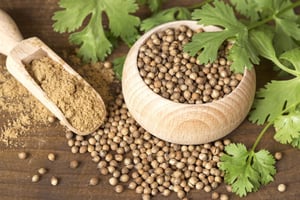By Maddy Davis, R.D.
 Whether you love it or hate it, many people have strong opinions about cilantro. But there’s much more to the herb than meets the eye, or the tastebuds. Coriander—a spice popular in Indian, Asian, and Middle Eastern cuisine—is the dried seed of the cilantro plant and has an entirely different flavor profile than cilantro. Though the two herbs have different flavors and appearances, in many countries around the world the name coriander refers to the seed as well as to the green leaves we know in the United States as cilantro. Coriander seeds can be used whole as a flavoring for food or ground up and used as a spice for seasoning. But did you know that the benefits of coriander extend far beyond adding flavor to your food? Coriander has been shown to possess properties that help to treat and prevent disease and promote health.
Whether you love it or hate it, many people have strong opinions about cilantro. But there’s much more to the herb than meets the eye, or the tastebuds. Coriander—a spice popular in Indian, Asian, and Middle Eastern cuisine—is the dried seed of the cilantro plant and has an entirely different flavor profile than cilantro. Though the two herbs have different flavors and appearances, in many countries around the world the name coriander refers to the seed as well as to the green leaves we know in the United States as cilantro. Coriander seeds can be used whole as a flavoring for food or ground up and used as a spice for seasoning. But did you know that the benefits of coriander extend far beyond adding flavor to your food? Coriander has been shown to possess properties that help to treat and prevent disease and promote health.
The CDC names heart disease as the number one cause of death in the United States, with the American Heart Association finding an increased risk of cardiovascular disease among individuals with low HDL (“good” cholesterol), high LDL (“bad” cholesterol), and high triglyceride levels. A study on the cholesterol lowering properties of coriander seeds showed the seeds to produce improvements in both cholesterol and triglyceride levels (Dhanapakiam, P., et al., 2008). In similar studies, the addition of coriander seed extract decreased LDL and total cholesterol and triglycerides, while increasing “good” HDL cholesterol, further demonstrating a positive correlation between coriander and heart health.
According to the CDC, diabetes is the seventh leading cause of death in the United States, and in 2015, 30.3 million Americans had diabetes and 84.1 million had prediabetes. The prolonged high blood glucose levels associated with diabetes have also been named as a risk factor for a number of other serious medical issues—such as kidney and heart disease, pregnancy complications, nerve damage, and stroke—all of which could ultimately result in death. However, various studies have demonstrated a correlation between consumption of coriander seeds and a hypoglycemic action, or a decrease in blood sugar levels, making the spice very useful in managing diabetes. Other studies have also shown that coriander seed extracts were able to decrease blood glucose and increase insulin sensitivity and activity, further affirming coriander’s health benefits (Eidi, M, et al., 2009).
Considering some of coriander’s noted health benefits, choosing to incorporate coriander into your diet can be an excellent way to protect your health while expanding your flavor palate. Given the unique flavors of this fragrant spice, even those who have a strong distaste of cilantro should consider giving coriander a try.
-
Use coriander to create a spice for meat rubs or in marinades.
-
Add coriander to flavor soups, sauces, curry dishes, stews, and more.
-
Add to pastries, doughs, and batters for an extra kick of flavor in baked goods.
-
Mix into potatoes, rice, or even scrambled eggs for a different flavor profile for common dishes.
We encourage you to use coriander in recipes at home! Download our featured ingredient card and recipe for Crispy Roasted Potatoes.


.png?width=1278&name=HHS-company%20logo-final%20(1).png)